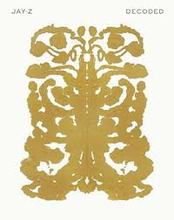 I recently had the pleasure of reading Decoded by Jay-Z, his cross between an autobiography and "decoding" of his rap lyrics. I was lucky enough to read the AV "enhanced" Kindle version, which featured several videos of Jay-Z talking about the songs and bringing the stores in the book to life. (I only wish it had more "behind the scenes" of his actual singing and music videos, but just hearing him speak and riff on the lyrics was cool too.) Jay-Z says he had three goals with the book. The first goal was to make the case that hip-hop lyrics (not just his lyrics, but those of every great MC) are poetry if you look at them closely enough. (I got a kick out of reading that because I've been telling my friends that for a while myself.) The second goal was to tell a little bit of the story of his generation and show the context for the choices they made. The third goal was to show how hip-hop created a way to take a very specific and powerful experience and turn it into a story that everyone in the world could feel and relate to. All three messages came across clearly in the book. The book alternated between prose and lyrical decomposition -- breaking down line by line (and often word by word) with footnotes describing the double and sometimes triple meanings behind the lyrics. I was amazed to see so much that I had missed from more cursory listening. I also learned a lot of interesting things about Jay-Z's life. His dad left his family when Jay-Z was very young, and though he did reunite with him, it was a very traumatic childhood. He saw his first murder at age 9 and would routinely wake up to the sound of gunshots in the New York Projects housing where he lived. He grew up hustling (selling drugs) on the streets and traveling all over the state to make a living. While doing this since a young age, he would write rhymes almost non-stop, stopping in the middle of crosswalks and noting down rhymes on paper bags. He couldn't stop the rhymes from coming into his head. He spent considerable time traveling around and rapping for others too, trying to get his break into the music industry, which never treated him well. In the end, he became a true entrepreneur. He risked all his capital and resources and pooled them with a friend to start his own label (Roc-A-Fella). This was the only way he could produce the music he wanted. He did the same thing for clothes. He saw what a large effect rap was having on the sales of other goods (like Cristal champagne), and when he wanted to team up with brands to cross-promote, no one would support him. He did the same thing with clothes as he did in music: he went out on his own and started Roc-A-Wear, a highly successful clothing company. Throughout the book, Jay-Z points out how people are naive and take his lyrics at only a surface level, thinking that all he says is true and how he feels. He says that he writes songs like authors write books and screenwriters write movies: they are stories meant to convey a message. In the same way you don't expect Matt Damon to be a spy in real life, the stories that Jay-Z sings in the first person are similarly pure narratives meant to grab attention but not actually cause you to believe every word. There was a lot of awesome stuff in the book, and below are some of my favorite quotes:
0 Comments
Your comment will be posted after it is approved.
Leave a Reply. |
Archives
June 2024
Categories
All
Subscribe |
 RSS Feed
RSS Feed
